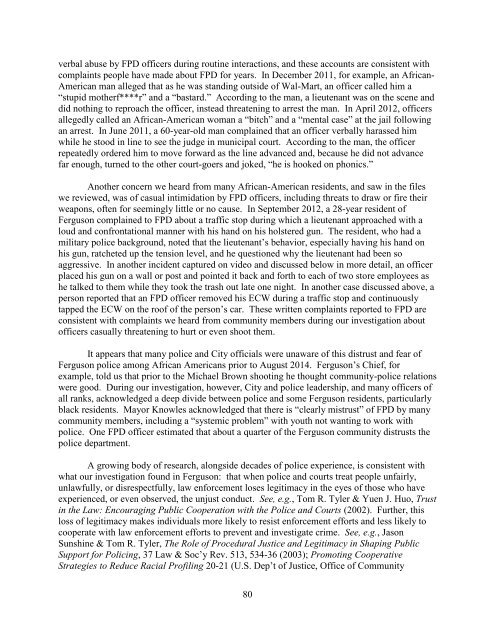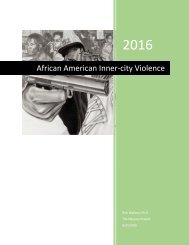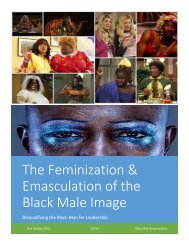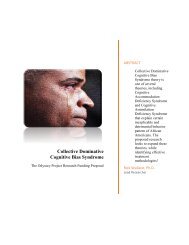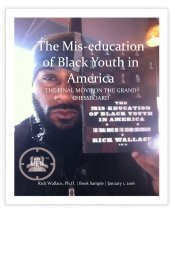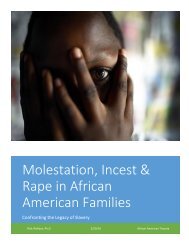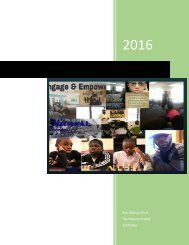U.S. Justice Department Report on the Ferguson Police Department
Ferguson’s law enforcement practices are shaped by the City’s focus on revenue rather than by public safety needs. This emphasis on revenue has compromised the institutional character of Ferguson’s police department, contributing to a pattern of unconstitutional policing, and has also shaped its municipal court, leading to procedures that raise due process concerns and inflict unnecessary harm on members of the Ferguson community.
Ferguson’s law enforcement practices are shaped by the City’s focus on revenue rather than by public safety needs. This emphasis on revenue has compromised the institutional character of Ferguson’s police department, contributing to a pattern of unconstitutional policing, and has also shaped its municipal court, leading to procedures that raise due process concerns and inflict unnecessary harm on members of the Ferguson community.
Create successful ePaper yourself
Turn your PDF publications into a flip-book with our unique Google optimized e-Paper software.
verbal abuse by FPD officers during routine interacti<strong>on</strong>s, and <strong>the</strong>se accounts are c<strong>on</strong>sistent with<br />
complaints people have made about FPD for years. In December 2011, for example, an African-<br />
American man alleged that as he was standing outside of Wal-Mart, an officer called him a<br />
“stupid mo<strong>the</strong>rf****r” and a “bastard.” According to <strong>the</strong> man, a lieutenant was <strong>on</strong> <strong>the</strong> scene and<br />
did nothing to reproach <strong>the</strong> officer, instead threatening to arrest <strong>the</strong> man. In April 2012, officers<br />
allegedly called an African-American woman a “bitch” and a “mental case” at <strong>the</strong> jail following<br />
an arrest. In June 2011, a 60-year-old man complained that an officer verbally harassed him<br />
while he stood in line to see <strong>the</strong> judge in municipal court. According to <strong>the</strong> man, <strong>the</strong> officer<br />
repeatedly ordered him to move forward as <strong>the</strong> line advanced and, because he did not advance<br />
far enough, turned to <strong>the</strong> o<strong>the</strong>r court-goers and joked, “he is hooked <strong>on</strong> ph<strong>on</strong>ics.”<br />
Ano<strong>the</strong>r c<strong>on</strong>cern we heard from many African-American residents, and saw in <strong>the</strong> files<br />
we reviewed, was of casual intimidati<strong>on</strong> by FPD officers, including threats to draw or fire <strong>the</strong>ir<br />
weap<strong>on</strong>s, often for seemingly little or no cause. In September 2012, a 28-year resident of<br />
Fergus<strong>on</strong> complained to FPD about a traffic stop during which a lieutenant approached with a<br />
loud and c<strong>on</strong>fr<strong>on</strong>tati<strong>on</strong>al manner with his hand <strong>on</strong> his holstered gun. The resident, who had a<br />
military police background, noted that <strong>the</strong> lieutenant’s behavior, especially having his hand <strong>on</strong><br />
his gun, ratcheted up <strong>the</strong> tensi<strong>on</strong> level, and he questi<strong>on</strong>ed why <strong>the</strong> lieutenant had been so<br />
aggressive. In ano<strong>the</strong>r incident captured <strong>on</strong> video and discussed below in more detail, an officer<br />
placed his gun <strong>on</strong> a wall or post and pointed it back and forth to each of two store employees as<br />
he talked to <strong>the</strong>m while <strong>the</strong>y took <strong>the</strong> trash out late <strong>on</strong>e night. In ano<strong>the</strong>r case discussed above, a<br />
pers<strong>on</strong> reported that an FPD officer removed his ECW during a traffic stop and c<strong>on</strong>tinuously<br />
tapped <strong>the</strong> ECW <strong>on</strong> <strong>the</strong> roof of <strong>the</strong> pers<strong>on</strong>’s car. These written complaints reported to FPD are<br />
c<strong>on</strong>sistent with complaints we heard from community members during our investigati<strong>on</strong> about<br />
officers casually threatening to hurt or even shoot <strong>the</strong>m.<br />
It appears that many police and City officials were unaware of this distrust and fear of<br />
Fergus<strong>on</strong> police am<strong>on</strong>g African Americans prior to August 2014. Fergus<strong>on</strong>’s Chief, for<br />
example, told us that prior to <strong>the</strong> Michael Brown shooting he thought community-police relati<strong>on</strong>s<br />
were good. During our investigati<strong>on</strong>, however, City and police leadership, and many officers of<br />
all ranks, acknowledged a deep divide between police and some Fergus<strong>on</strong> residents, particularly<br />
black residents. Mayor Knowles acknowledged that <strong>the</strong>re is “clearly mistrust” of FPD by many<br />
community members, including a “systemic problem” with youth not wanting to work with<br />
police. One FPD officer estimated that about a quarter of <strong>the</strong> Fergus<strong>on</strong> community distrusts <strong>the</strong><br />
police department.<br />
A growing body of research, al<strong>on</strong>gside decades of police experience, is c<strong>on</strong>sistent with<br />
what our investigati<strong>on</strong> found in Fergus<strong>on</strong>: that when police and courts treat people unfairly,<br />
unlawfully, or disrespectfully, law enforcement loses legitimacy in <strong>the</strong> eyes of those who have<br />
experienced, or even observed, <strong>the</strong> unjust c<strong>on</strong>duct. See, e.g., Tom R. Tyler & Yuen J. Huo, Trust<br />
in <strong>the</strong> Law: Encouraging Public Cooperati<strong>on</strong> with <strong>the</strong> <strong>Police</strong> and Courts (2002). Fur<strong>the</strong>r, this<br />
loss of legitimacy makes individuals more likely to resist enforcement efforts and less likely to<br />
cooperate with law enforcement efforts to prevent and investigate crime. See, e.g., Jas<strong>on</strong><br />
Sunshine & Tom R. Tyler, The Role of Procedural <str<strong>on</strong>g>Justice</str<strong>on</strong>g> and Legitimacy in Shaping Public<br />
Support for Policing, 37 Law & Soc’y Rev. 513, 534-36 (2003); Promoting Cooperative<br />
Strategies to Reduce Racial Profiling 20-21 (U.S. Dep’t of <str<strong>on</strong>g>Justice</str<strong>on</strong>g>, Office of Community<br />
80


